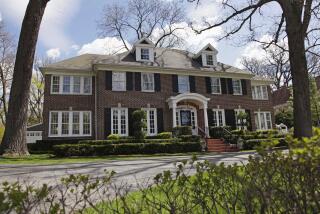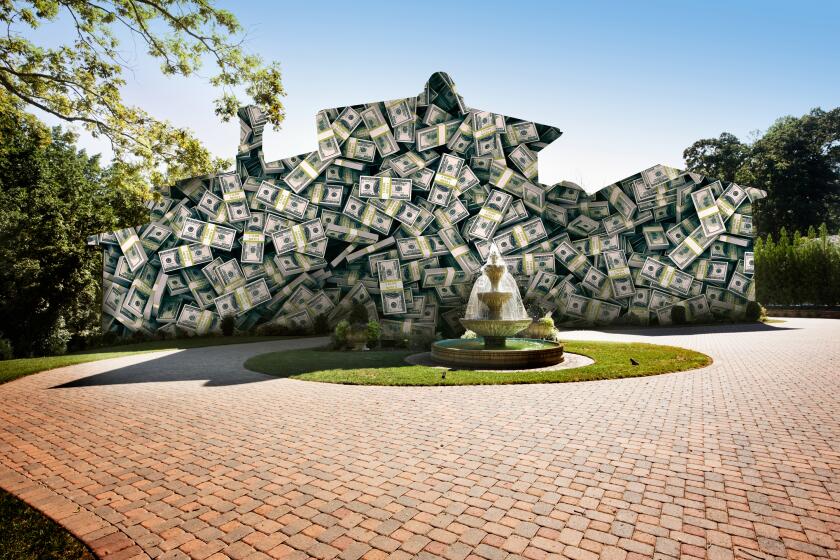‘Uncle Tom’s Cabin’ writer’s childhood home for sale on EBay — assembly required
The Connecticut house where “Uncle Tom’s Cabin” author Harriet Beecher Stowe was born and lived until she was 14 — which was disassembled 20 years ago — is up for auction on EBay for $400,000.
Just the pieces of the house, which can be reassembled, are for sale. Currently there are no bids on the house. The auction ends Monday. Art Pappas, the antiques dealer and estate sales agent who posted the listing, said the house will be re-listed if it does not sell.
Pappas said he and a partner whom he would not name own the deconstructed house, which is listed on the state’s Register of Historic Places. It is currently stored in two semi trailers and two storage containers, some in Massachusetts and some in Connecticut.
In a phone interview, Pappas said the $400,000 price tag is more a starting point for negotiation than a real price.
“We’re looking for a reasonable amount of money. We’re not looking to get rich off of it,” he said.
He has tried to sell the house repeatedly. “We contacted the Smithsonian. We got no response. I don’t know where else to go with it,” Pappas said. “EBay seems to be the only place where people will see it. We even put it on Craigslist.”
The house was built in 1774 in Litchfield, Conn., by Elijah Wadsworth, a Revolutionary War captain and a major general in the War of 1812. In 1810 Wadsworth sold it to the Rev. Lyman Beecher, who moved in with his family. The Congregationalist minister’s 13 children included Harriet (born in 1811), clergyman Henry Ward Beecher (born in 1813) and suffragist Isabella Beecher Hooker (born in 1822).
The Beecher family vacated the house in 1826. On March 4, 1826, Harriet Beecher wrote to her grandmother, Roxana Ward Foote, “You have probably heard that our home in Litchfield is broken up. Papa has received a call to Boston and concluded to accept, because he could not support his family in Litchfield. He was dismissed last week Tuesday, and will be here [Hartford] next Tuesday with mamma and Isabel. Aunt Esther will take Charles and Thomas to her house for the present.”
Stowe — who grew up to be an abolitionist writer, publishing “Uncle Tom’s Cabin” in 1852 — recounted events from her Litchfield childhood in “Poganuc People,” published in 1878. She died in 1896.
The house has a lively history. Long after the Beechers lived there, it was moved — hauled by oxen — to a new location, where it became a sanitarium. Then the building was taken over by Spring Hill School, which used it as a dormitory. Another future legend, singer Pete Seeger, lived in the dorm from 1927 to 1929. Later, the house was used as a dorm by Forman School, a school for students with learning disabilities.
In 1997, Forman sold the run-down house for $1 to Chandler Saint and Stephen Solley, who dismantled it. Saint and Solley planned to relocate the house, but they faced legal challenges over zoning. The controversy stoked outrage in Litchfield’s historical, preservation, political and property-owning communities.
Pappas said Saint and Solley gave up and passed the house on to him and his partner.
The listing describes the house as an “original rare type center hall hip roof timber frame house 32’ x 30’. An 18’ x 30’ addition was added by Lyman Beecher in 1814. The roof was changed to a full gable type around 1870. Every single thing has been saved including the original plaster walls, They are crated in plywood and have been removed whole. The dirt and fragments between the walls have even been saved for possible forensic analysis.”
The listing continued: “We are seeking a person or organization that is financially capable to correctly restore this national treasure. There is a full set of detailed plans, full documentation, a complete forensic paint analysis was done prior to dismantling, at a cost of 50k in 1997.”
When reached for comment about the auction, Litchfield Historical Society Executive Director Catherine Fields would say only: “It turned into a brouhaha 20 years ago, and I’m not willing to do that again.”
Katherine Kane, executive director of Harriet Beecher Stowe Center in Hartford — located in the home where Stowe lived for the last 23 years of her life — said the Stowe Center decided not to buy the childhood home when it was for sale 20 years ago and is not interested in it now.
“There were questions about how much of the house was original to the Beecher era,” Kane said.
Trinity College professor Joan Hedrick, whose 1994 biography of Stowe won the Pulitzer Prize, wondered about the storage conditions.
“They’ve been in trailers for 20 years. Was there air conditioning running in these semis? It’s not likely. I don’t know what the condition of those materials are. I don’t know whether it’s reconstructible,” Hedrick said. “I saw it when it was still standing. It was in pretty bad shape.... And yet there were historical materials recoverable from it.... Somebody would really need to check that out before they decided to reconstruct it.”
More to Read
Sign up for Essential California
The most important California stories and recommendations in your inbox every morning.
You may occasionally receive promotional content from the Los Angeles Times.







